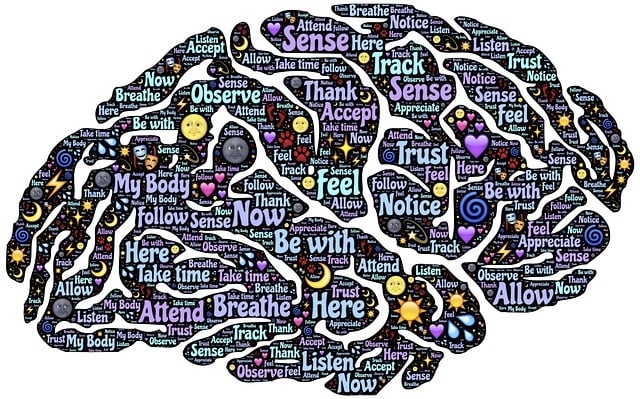Mental health policies in diverse areas like Northglenn play a crucial role in community well-being, focusing on accessible and affordable services, including burnout prevention for healthcare providers. By integrating coping skills and emotional healing initiatives, these policies reduce stigma and promote early intervention. Northglenn residents are adopting Somatic Experiencing Therapy (SET) for trauma and stress relief, focusing on the mind-body connection and mindfulness meditation to enhance resilience. Advocacy, storytelling, and partnerships drive policy change, ensuring funding for innovative treatments like SET, ultimately improving mental health policies and overall wellness.
Mental health policy is a critical component of community well-being, shaping access to care and shaping societal attitudes. This analysis explores how Northglenn’s innovative approach to integrating Somatic Experiencing Therapy (SET) can drive meaningful mental health policy change. We delve into the impact of SET on addressing deep trauma, understanding community needs, and advocacy strategies that empower individuals and promote holistic mental health. By examining Northglenn’s model, we uncover effective ways to improve mental healthcare accessibility and outcomes.
- Understanding Mental Health Policy and Its Impact on Communities
- The Role of Somatic Experiencing Therapy (SET) in Addressing Mental Health Issues
- Advocacy Strategies for Effective Mental Health Policy Change
- Northglenn's Approach to Integrating SET into Community Mental Health Initiatives
Understanding Mental Health Policy and Its Impact on Communities

Mental health policy plays a pivotal role in shaping the well-being of communities, especially in diverse areas like Northglenn, where unique challenges exist. Effective policies can ensure accessible and affordable mental health services, addressing issues such as burnout prevention strategies for healthcare providers. By integrating coping skills development and emotional healing processes into community initiatives, policy advocates aim to reduce stigma and promote early intervention. This holistic approach is crucial in tackling the rising mental health concerns among residents, many of whom may turn to untraditional methods like Somatic Experiencing Therapy for relief from trauma and stress-related issues.
Understanding these policies’ impact on communities involves recognizing how they influence service provision, funding allocation, and community engagement. Local initiatives, for instance, can foster a sense of belonging and support, encouraging individuals to seek help without fear of judgment. Such efforts complement the work of healthcare providers, offering sustainable solutions to prevent burnout and enhance overall mental resilience within Northglenn’s diverse population.
The Role of Somatic Experiencing Therapy (SET) in Addressing Mental Health Issues

Somatic Experiencing Therapy (SET) offers a unique and innovative approach to addressing mental health issues, with many healthcare providers in Northglenn turning to this method for its profound impact on patient care. By focusing on the mind-body connection, SET helps individuals process and release traumatic memories and emotions, which are often at the root of various mental health disorders. This therapy technique is built on the understanding that physical sensations and emotional responses are intricately linked, allowing patients to access and heal from deep-seated trauma.
In today’s fast-paced world, where burnout among healthcare providers is a growing concern, SET can play a pivotal role in preventing and managing stress. Mindfulness meditation techniques are an integral part of this process, enabling practitioners to enhance their self-awareness and resilience. By incorporating SET into mental health care, Northglenn healthcare providers can offer holistic support, targeting not just symptoms but the underlying causes of distress, thereby fostering improved Mental Health Awareness and overall well-being.
Advocacy Strategies for Effective Mental Health Policy Change

Advocacy plays a pivotal role in driving mental health policy change and improving access to quality care. Effective advocacy strategies involve raising awareness about mental health issues, challenging stigmatization, and educating policymakers on evidence-based practices. One powerful approach is through storytelling, where individuals share their personal journeys with mental illness, highlighting the impact of stigma and the transformative power of therapy. Northglenn Somatic Experiencing Therapy (SE) serves as a compelling example, focusing on emotional healing processes to build resilience in individuals struggling with trauma and stress.
Organized campaigns, community engagement, and partnerships with healthcare providers are essential tools. Mental health advocacy groups can lobby for policy reforms, ensuring that funding is allocated towards innovative treatments like SE, which has shown promising results in promoting mental wellness. By fostering collaboration between policymakers, therapists, and affected communities, these strategies collectively contribute to a more comprehensive understanding of mental health, leading to better policies and improved support systems.
Northglenn's Approach to Integrating SET into Community Mental Health Initiatives

Northglenn has pioneered an innovative approach to integrating Somatic Experiencing Therapy (SET) into community mental health initiatives. By weaving SET into their programs, Northglenn aims to holistically address mental health concerns by focusing on the profound connection between physical and emotional well-being. This strategy recognizes that mental wellness is not merely the absence of illness but a state of thriving that encompasses self-esteem improvement and inner strength development.
The city’s initiative emphasizes the role of therapy in empowering individuals to access their inherent resilience, fostering mental wellness coaching programs that go beyond symptom management. By integrating SET, Northglenn seeks to revolutionize the mental health landscape, offering residents not just treatment but a path towards profound personal growth and enhanced quality of life.
Mental health policy analysis and advocacy are essential components of creating a supportive environment for community well-being. By understanding the impact of mental health policies, exploring innovative therapies like Somatic Experiencing Therapy (SET), and employing effective advocacy strategies, communities can drive meaningful change. Northglenn’s integration of SET into their mental health initiatives serves as a promising model, demonstrating how holistic approaches can revolutionize care accessibility and outcomes. This analysis highlights the potential for policy-driven interventions to foster healthier, more resilient communities, with a focus on evidence-based practices like Northglenn Somatic Experiencing Therapy.














